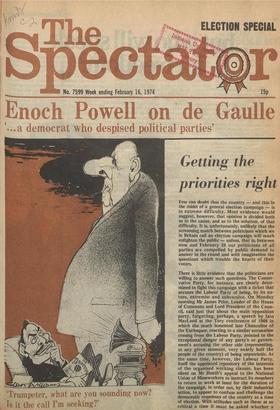Getting the priorities right
Few can doubt that the country ŌĆö and this in the midst of a general election campaign ŌĆö is in extreme difficulty. Most evidence would suggest, however, that opinion is divided both as to the cause, and as to the solution, of that difficulty. It is, unfortunately, unlikely that the screaming match between politicians which we in Britain call an election campaign will much enlighten the public ŌĆö unless, that is, between now and February 28 our politicians of all parties are compelled by public demand to answer in the round and with imagination the questions which trouble the hearts of their voters.
There is little evidence that the politicians are willing to answer such questions. The Conservative Party, for instance, are clearly determined to fight this campaign with a ticket that accuses the Labour Party of being, by its nature, extremist and subversive. On Monday morning Mr James Prior, Leader of the House of Commons and Lord President of the Council, said just that about the main opposition party, forgetting, perhaps, a speech by lain MacLeod at the Tory conference of I969 in which the much lamented late Chancellor of the Exchequer, reacting to a similar accusation coming from the Labour Party, pointed to the exceptional danger of any party's or government's accusing the other side (representing, at any given moment, very nearly half the people of the country) of being unpatriotic. At the same time, however, the Labour Party, itself the appointed repository of the interests of the organised working classes, has been silent on Mr Heath's appeal to the National Union of Mineworkers to instruct its members to return to work at least for the duration of the campaign, in order not, by their industrial action, to appear to confuse and challenge the democratic responses of the country at a time of election. With attitudes such as these at so critical a time it must be asked whether a


































